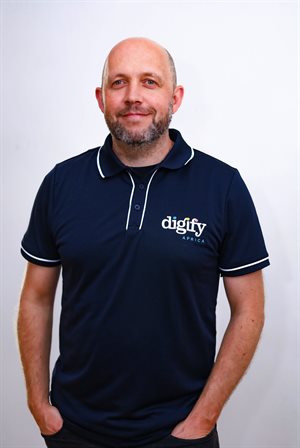
Covid really shone a light on e-learning, and the so-called developed world has embraced e-learning, so much so that every kind of learning, such as virtually obtained degrees, can be found online.
We have seen the growth of big players in this space, but while these platforms work and are successful, they exclude many people within the African context.
Even where solutions are being designed within the Africa context, too often the same mistakes are made, such as designing for desktop computer, or laptop, and good internet connection or high data usage and costs.
Unfortunately, in Africa only a minority of people have these tools.
The result is a mismatch between the available online education tools and the people who need these opportunities the most but are unable to access them. The distance between what is available to everyone and what isn’t, especially if you are living in a rural or peri-rural area and have a low-end smartphone, is huge, making it impossible for many young people to access eLearning.
We are trying to address this problem through our DigiBot product, which is a low-tech solution designed especially for these conditions to provide the lowest possible barrier to entry to e-learning.
Key to this is WhatsApp. Not only is it a platform most people are familiar with, generally it is already on their phones, so they understand it and they don’t need to download an app. With the DigiBot, we have built a product that can deliver full learning courses within WhatsApp using chatbot driven technology, giving the user an engaging experience that is affordable and easy to access.
Accessing the content does not use a lot of data, which is the only cost to the user (we do not charge the user). Even then the data cost is minimal making it affordable even for lower income person. For example, to complete one of our current short courses, it would only cost the user 45 megabytes of data, a fraction of the cheapest data top-up available.
Apart from accessibility, the other issue we are trying to address is digital literacy.
In the digital space, formal education struggles to keep up with digital skills, and when young people look for a job, what often counts more in the job market is their experience and ability and skills of these platforms.
For us it is about guiding young people on a pathway towards skills that can open opportunities for them to build a livelihood.
Our goal, by using WhatsApp as a tool to bridge the gap between learning and earning, is to provide not only basic skills, but to take young people further on a journey to deep skills, work readiness, and all the way to work matching.
With the DigiBots we have been able to utilise our wealth of learning content by turning this content into short programmes. We also wanted a wider reach, and the approach has supercharged our ability to do that, having signed up over 700,000 users so far.
The DigiBot has been designed as an interactive learning experience complete with gamification, leaderboards, certificates, and quizzes, with each chatbot having its own persona and name, linked to its target audience.
The two most popular chatbots are Lesedi, a digital literacy chat bot aimed broadly at young people, aged 18 to 25 years old and Kitso, which is aimed at the education sector at teachers and teaching assistants.
We integrated ChatGPT into the chatbots, which, apart from the benefit to learners of AI-powered support in real time, makes for an accelerated learning progress and a richer experience.
Going forward, we aim to automate the language translation to recreate bots in other languages that will suit different countries and language groups on the continent.
Ultimately, we would like to see the chatbots offer universal access for learners everywhere on the continent.
The programme was developed in partnership with Techsys Digital, a Cape Town software development company, and developed in partnership with Meta, one of Digify Africa’s major partners on the continent in providing training to young people.
“We are proud to partner with Digify Africa to provide new avenues of learning through WhatsApp. We strategically use WhatsApp to deliver essential content that enables self-directed learning, ensuring widespread availability to empower individuals in a way that is familiar, easy, and fun,” says Phil Oduor, policy programs lead, sub-Saharan Africa, Meta.
While DigiBot sits in the company’s startup in the technology sector, we are also a non-profit that provides digital skills and education for young people to ultimately create jobs for the youth.
We partner with the Department of Basic Education’s (DBE) presidential youth employment initiative, which gives stipend jobs to literally hundreds of thousands of teaching assistants.
This programme has been completed by 120,000 learners – all young people who before would have been unemployed young people.
From a start-up perspective, our goal is to build a sustainable business by making this product useful to other people.
We are looking at a B2B and B2C model, as we can build and deploy this programme for other companies who want to reach learners with their content in the same way, either through our bot or by building them their own chat bot.
On the B2B side we have had our first big win, recently signing our first client, a financial institution, that has provided us with their financial literacy content, that we will put out through the Lesedi chat bot.